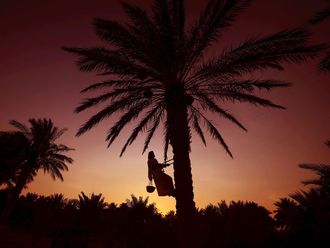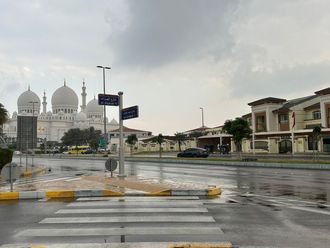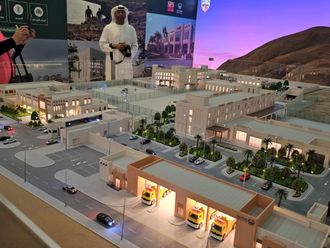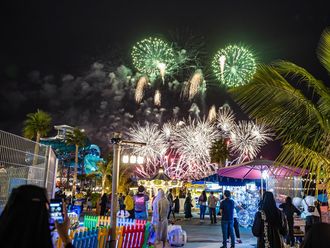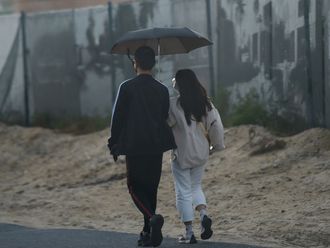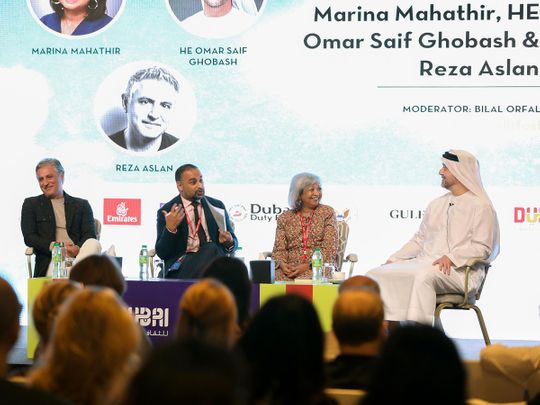
Dubai: The openness to other faiths enriches Muslim identity, a top UAE diplomat and author said at the Emirates Airline Festival of Literature (Emirates LitFest) in Dubai on Saturday.
Omar Saif Ghobash, Assistant Minister for Culture and Public Diplomacy at the Ministry of Foreign Affairs and International Cooperation and the UAE Ambassador to the Holy See, was speaking at a session titled ‘Past, Present and Future of Islam’ along with Malaysian journalist, activist and author Marina Mahathir and Iranian-American religious scholar, author and Emmy and Peabody-nominated producer Reza Aslan.
Answering a question by the moderator Bilal Orfali on what he would have added now to his 2017 book ‘Letters to a Young Muslim’ that was addressed to his son, Ghobash said he would have chosen to write about the political changes in the outreach to other faiths that have taken place here in the UAE.
He pointed out that the “taboo around dealing with Judaism and Israel had been removed and we are now able to compartmentalise political and religious issues and we are able to work together here”.
“This actually allows us to begin to communicate much, more broadly,” he said, citing the outreach to the Vatican and Christian community as well.
“This allows us again, to start saying, okay, we have our truth, but that doesn’t mean that other faiths and other traditions don’t have truth as well. That can assist us in deepening our own self-understanding. And I think, the openness to others shouldn’t scare us, and then make us think that we lose our identity. It enriches our identity; it allows us to say…we’re actually humans. And we all come from the same human condition.”
Role of clerics
In other remarks, Ghobash called for provisions for individuals to have dialogues with Muslim clerics. He pointed out that the traditional version of Islam had been seeing a sudden change over the last few years. “You see that we are changing our approach to the tradition.”
In this context, he called for a larger participation of Muslim clerics in having dialogues about these changes. “Some of the top clerics can stick to these ideas of tradition, but can also turn on a dime. So, that actually puts a lot back into the space of the individual. How do we orient ourselves? How do we then speak to the clerical class and ask them also to come to the table?”
Ghobash cited a process in Vatican as an example that can get religious clerics to talk about the changes in the community and widen their perspectives.
“So they have this process whereby the clerics will sit with experts in various fields who are not specifically religiously- oriented. And then you have the people who are Catholics who have an opinion and to get that dialogue going. It connects theology with practical problems that people are facing in their daily lives. So this is where I think we need to begin to engage...”
read more
- Dubai is a city that puts its people first, UAE minister says at Emirates LitFest 2023
- Latifa bint Mohammed attends opening of 15th edition of Emirates Airline Festival of Literature
- Meet British couple on a ‘literary pilgrimage’ to Dubai
- ‘Ask Ali’ anything about UAE culture at Emirates Airline Festival of Literature in Dubai
'Renewal of Islam'
According to Aslan, the innovation or the renewal of Islam is happening all over the world, including in the UAE.
He was addressing a question on similar changes in the US where he said “new and interesting expressions and interpretations of Islam” were being created.
Aslan said: “Which because of America’s reach and power, and the fact that we have a very, loud voice, and we insist everyone hears it, whether they want to or not, has begun to have some influence in the way that Muslims elsewhere are starting to interpret their religion because they have easy access to these kinds of new and innovative thoughts. But I want to make it very clear that this is not unique to America. The innovation of Islam, the renewal of Islam is happening all over the world, including here in the Emirates.”
Aslan added religion is the language that we use to communicate faith. He also compared religion as water and culture as the vessel that gives shape to that water in different countries or regions.
Pointing out that several religions died as they could not adapt to the changes and needs of the people and time, he highlighted the need for religions including Islam to use its foundation to evolve and answer the questions that are relevant today.
Women's empowerment
A social and political commentator who has challenged the rise of political Islam in her home country, Mahathir said Muslim women themselves have to come out and challenge the stereotypes.
“Many times we are asked to fit into those stereotypes, even in my country, which calls itself a Muslim country and has all these leading women…Still, if we say something different from the norm, then we’re edged out and we don’t have the space. So it’s a constant fight to be able to have our voices out there to present alternative voices, and to face the challenges,” she added.
Mahathir said she had built her own identity by moving away from that of a daughter of the former Prime Minister Mahathir Mohammad which she had found “irritating”.
Batting for women’s power in religious positions, Mahathir cited the Indonesian Women’s Ulema Congress as an example that has excited her.
She also called for an end to the propagation of the idea “that to be a good Muslim, you have to copy traditions from the Middle East.”



